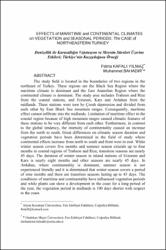Effects of Marıtıme and Contınental Clımates on Vegetatıon and Seasonal Perıods: The Case of Northeastern Turkey
Özet
The study field is located in the boundaries of two regions in the
northeast of Turkey. These regions are the Black Sea Region where the
maritime climate is dominant and the East Anatolian Region where the
continental climate is dominant. The study area includes Trabzon and Rize
from the coastal stations, and Erzurum, Kars and Ardahan from the
midlands. These stations were torn by Çoruh depression and divided from
each other by East Black Sea mountain ranges. Consequently, maritime
effect cannot infiltrate into the midlands. Limitation of maritime effect in the
coastal region because of high mountain ranges caused climatic features of
these stations to be very different from each other. Furthermore, in contrast
to the global tendency, the intensity of continentality caused an increase
from the north to south. Great differences on climatic season duration and
vegetation periods have been determined in the field of study where
continental effects increase from north to south and from west to east. While
winter season covers five months and summer season extends up to four
months in coastal regions of Trabzon and Rize, transition seasons are nearly
45 days. The duration of winter season in inland stations of Erzurum and
Kars is nearly eight months and other seasons are nearly 45 days. In
Ardahan, where continentality is dominant, summer season is not
experienced literally and it is determined that winter season covers a period
of nine months and there are transition seasons lasting up to 45 days. The
conditions of maritime and continentality have influenced vegetation periods
and while plants can show a development in the coast for a long period of
the year, the vegetation period in midlands is 100 days shorter with respect
to the coast Ġnceleme alanı Türkiye’nin kuzeydoğusunda, iki bölge sınırları
içinde bulunur. Bu bölgeler denizel iklimin hâkim olduğu Karadeniz Bölgesi
ile karasal iklimin egemen olduğu Doğu Anadolu Bölgesidir. ÇalıĢmada,
kıyı istasyonlardan Trabzon ve Rize, iç kısımda ise Erzurum, Kars ve
Ardahan istasyonları ele alınmıĢtır. Bu istasyonlar Çoruh depresyonu ile
yarılmıĢ Doğu Karadeniz sıradağlarıyla birbirinden ayrılmıĢtır. Bu nedenle
denizel etki iç kısma sokulamaz. Denizel etkinin yüksek sıradağlar nedeniyle
kıyıda sınırlanması bu istasyonların iklim özelliklerinin de birbirinden çok
farklı olmasına neden olmuĢtur. Hatta karasallığın Ģiddeti, küresel eğilimin
aksine kuzeyden güneye doğru artmasına neden olmuĢtur. Karasal etkilerin
kuzeyden güneye ve batıdan doğuya doğru arttığı inceleme alanında,
klimatik mevsim süreleri ve vejetasyon devrelerinde büyük farklılıklar tespit
edilmiĢtir. Kıyıda yer alan Trabzon ve Rize’de kıĢ mevsimi beĢ aya, yaz
mevsimi ise dört aya kadar uzarken geçiĢ mevsimleri yaklaĢık 45 gün
kadardır. Ġç kısımda bulunan Erzurum ve Kars’ta kıĢ mevsiminin süresi
yaklaĢık sekiz ay kadar iken diğer mevsimler 45 gün kadardır. Karasallığın
hâkim olduğu Ardahan’da ise gerçek anlamda yaz mevsimi yaĢanmamakta
olup dokuz ay süren bir kıĢ mevsimi ile 45 gün süren geçiĢ mevsimlerinin
olduğu tespit edilmiĢtir. Denizellik ve karasallık durumu vejetasyon
devrelerine de yansımıĢ olup kıyıda yılın büyük bir bölümünde bitkiler
geliĢme gösterebilirken iç kısımda vejetasyon devresi kıyıya göre 100 gün
kısalmıĢtır.
Cilt
14Sayı
2Bağlantı
http://hdl.handle.net/11630/3806Koleksiyonlar
- Cilt 14 : Sayı 2 [14]



















